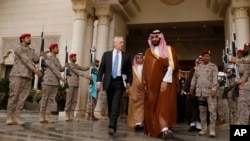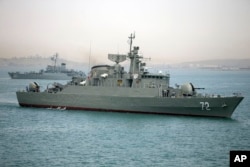The United States is pledging support for Saudi efforts to counter Iran's destabilizing activities in the region.
During talks Wednesday in Riyadh, U.S. Defense Secretary Jim Mattis emphasized to his Saudi counterpart, Deputy Crown Prince Mohammed Bin Salman, the importance of cooperating and boosting Saudi security in order to "reinforce Saudi Arabia's resistance to Iran's mischief."
"We are not leaving this region, but at the same time it is in our interest to see a strong Saudi Arabia military, security services and secret services," Mattis told reporters. "So what we can do here today could actually open the door possibly to bringing our president to Saudi Arabia."
The Arab kingdom is Mattis' first stop on a week-long Middle East tour, that includes Egypt, Israel and Qatar.
Earlier on Wednesday, the U.S. defense secretary met with Saudi King Salman.
The visit comes a month after U.S. President Donald Trump hosted Prince Mohammed at the White House, with both leaders noting the "importance of confronting Iran's destabilizing regional activities while continuing to evaluate and strictly enforce the Joint Comprehensive Plan of Action," according to a March 15 White House statement.
On Wednesday, the Saudi defense minister told Mattis, "we greatly value the leadership of President Trump."
He also said the two countries will work to "curb and counter all the challenges in the region, either when it comes to the curbing of the fighting terrorist organizations or the malign activities of Iran that continues to unsettle the world."
In remarks to Pentagon reporters following Wednesday's talks with Saudi officials, Mattis praised Saudi Arabia's regional leadership role in restoring stability in the Middle East.
The U.S. defense secretary also said the U.S. is watching Iran's impact across the region, from its support for Hezbollah to the Syrian regime of Bashar al-Assad.
"Everywhere you look, if there is trouble in the region, you find Iran," Mattis said. "So, right now, what we are seeing is the nations in the region and others elsewhere trying to checkmate Iran and the amount of disruption, the amount of instability they can cause."
While in Riyadh, Mattis also called for the crisis in Saudi Arabia’s neighbor, Yemen, to go before a United Nations-brokered negotiating team in order to “politically” resolve the country’s raging civil war.
U.S. officials have signaled that President Donald Trump may further U.S. involvement in Yemen crisis in order to strengthen strategic relations with the Saudis, who have been supporting the fight against Iranian-backed Houthi rebels.
A U.S. official, speaking on condition of anonymity, said the Trump administration does not believe that Yemen's government and the Houthis will to go to a U.N.-brokered negotiating table unless more military pressure is put on the Houthis, in order to convince the rebels they are incapable of holding their captured terrain.
The official added that the U.S. was not considering American troops on the ground in Yemen as an option to increase military pressure.
Iran sends flotilla to Gulf of Aden
The comments come amid reports Iran dispatched a a flotilla of warships from the country’s southern port city of Bandar Abbas for the Gulf of Aden on Monday.
Iranian authorities say Iran's 46th naval fleet, comprised of Sabalan destroyer and Lavan logistic warship, embarked on the voyage in a bid to maintain the Islamic Republic’s power in the high seas.
"The timing of this mission, and also increasing number of naval missions conducted by Iranian navy in that region is very uncommon and seems to be a muscle flexing toward Saudis,” Hooshang Aryanpour, a Virginia based retired Iranian Rear Admiral told VOA.
"The fleet is tasked with maintaining security for Iranian ships and countering Iranophobic plots and campaigns launched by the enemies of the Islamic Republic,” the Iranian government said in a statement.
According to Rear Admiral Sayyari, the Iranian naval forces are making efforts to improve security in the Gulf of Aden, the Red Sea and the Bab el-Mandeb, considering security of those regions as a top priority.
Iranian authorities say that the naval forces have so far escorted 3,850 Iranian commercial and tanker ships as well as 25 foreign vessels in the Bab el-Mandeb and the Gulf of Aden regions where pirates are active.
U.S. marine administrators in the region have repeatedly complained about Iran’s hostile nautical maneuvers in the region in the recent months and warned that some provocative naval actions increase the chances of miscalculation and unintended confrontation.
“[The] Iranian navy’s increasing presence in this specific region is evocative and could be interpreted as showing teeth to Saudis who are in a proxy war with Iran in Yemen and have zero strength in the sea," said Aryanpour.
Mehdi Jedinia contributed to this report

